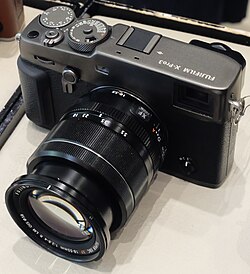 X-Pro3 +XF18mm-55mm F2.8-4 R LM OIS | |
| Overview | |
|---|---|
| Maker | Fujifilm |
| Type | Mirrorless camera |
| Released | October 23, 2019 [1] |
| Intro price | USD 1,799 (body) |
| Lens | |
| Lens mount | Fujifilm X |
| Lens | Interchangeable lens |
| Sensor/medium | |
| Sensor type | X-Trans CMOS 4 |
| Sensor size | 23.5 mm x 15.6 mm (APS-C) |
| Sensor maker | Sony |
| Maximum resolution | 6240 x 4160 (26.1 megapixels) |
| Film speed | 160–12800 (standard) 80–51200 (extend) |
| Recording medium | SD, SDHC, SDXC V30, UHS-II, UHS-I |
| Storage media | SD card |
| Focusing | |
| Focus | Intelligent Hybrid TTL contrast detection / Phase detection |
| Focus modes | Single point, Zone, Wide/Tracking |
| Focus areas | 91 focus point |
| Focus bracketing | Auto, Manual |
| Exposure/metering | |
| Exposure | TTL 256-zones metering |
| Exposure modes | Program, Aperture Priority, Shutter Speed Priority, Manual Exposure |
| Metering modes | Multi, Spot, Average |
| Flash | |
| Flash | External Flash |
| Flash synchronization | 1/250 s |
| Flash bracketing | ±1/3EV, ±2/3EV, ±1EV |
| Compatible flashes | Dedicated TTL Flash compatible |
| Shutter | |
| Shutter | Focal Plane Shutter |
| Shutter speeds | 4 s to 1/8000 s (mechanical), 4 s to 1/32000 s (electronic) |
| Continuous shooting | 30 frames per second |
| Viewfinder | |
| Viewfinder | 0.5 in 3.69M dots OLED, Hybrid OVF and EVF |
| Viewfinder magnification | 0.66 |
| Frame coverage | 100% |
| Image processing | |
| Image processor | X-Processor 4 |
| White balance | Auto, Custom, Preset, Fluorescent, Incandescent, Underwater |
| WB bracketing | ±1, ±2, ±3 |
| Dynamic range bracketing | 100%, 200%, 400% |
| General | |
| Video recording | MP4 / MOV DCI 4K up to 30 fps, 4K up to 30 fps, 1080p up to 120 fps |
| LCD screen | 3.0 in 1.62M dots Hidden-tilt touchscreen |
| Battery | NP-W126S Li-ion |
| AV port(s) | 2.5 mm audio jack |
| Data port(s) | USB-C 3.1, Wi-Fi 4, Bluetooth 4.2 |
| Body features | Ultra Sonic Vibration Sensor Cleaning system |
| Dimensions | 140.5 mm × 82.8 mm × 46.1 mm (5.53 in × 3.26 in × 1.81 in) |
| Weight | 497 g (18 oz) (1.096 lb) without battery and memory card |
| Made in | |
| Chronology | |
| Predecessor | Fujifilm X-Pro2 |
| References | |
| [2] [1] | |
The Fujifilm X-Pro3 is a mirrorless interchangeable-lens digital camera announced on October 23, 2019. [3] [4] It is part of Fujifilm's X-Series of cameras, the successor to the X-Pro2. Sales began on November 28, 2019. [5]
Contents
X-Pro3 is the latest release of the series.




